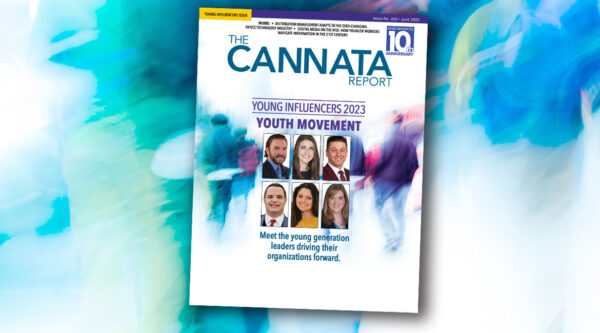The office technology industry’s future looks bright based on the resumes of this year’s Young Influencers.
Organizations all across our industry have seen explosive growth in the past year, and a new generation of Young Influencers are leading the way, heading up divisions, staking out new territory, and creating new lines of business, even at companies older than the internet.
Some are second—or third—generation leaders, bringing their education and experience outside the industry back to the family business. Some found their dream companies as interns and climbed the ladder year by year, while others thought they’d have completely different careers in completely different fields before finding and falling in love with the people-centric, solutions-oriented, ever-innovating industry we have today.
Best of all, these young people are excited about the future of not only their own careers but also this industry. They have strong vision and confidence, they know how to leverage technology, and they have the social awareness and sense of professionalism to propel the industry forward.
We are pleased to present this year’s roster of six up-and-coming executives under 40 and give you a glimpse of how they are establishing their careers, contributing to their organizations, and building this industry’s future.

Young Influencer: Hannah Allpress
Age 23
Account Executive, MSP Channel Manager at Collabrance, a GreatAmerica Company
Hannah Allpress started working with GreatAmerica Financial Services as a teenager, only a few weeks out of high school. She’d been planning to pursue a career in pharmacy, even going so far as to do a summer internship at a local hospital in Cedar Rapids, Iowa, before her senior year, but when an opportunity presented itself at GreatAmerica Financial Services she decided to see what the world of business was all about.
“Initially, I was just doing pretty simple tasks and data cleanup in Salesforce,” said Hannah. “I set up interviews with sales reps once a week, and it ended up being the highlight of my internship, every single week.”
The human connection of sales and the rapport sales reps enjoyed with clients and peers sparked something in her. “I just felt like I was looking at myself in the future when interacting with the sales reps. Their stories about their relationships with their customers really inspired me to move into more of a sales seat.”
Feeling motivated, Hannah altered her college plans and enrolled in business school at the University of Iowa, applying on the last day admissions were open for her freshman year. This was 2020, so by the end of the spring term, her classes and her second internship with GreatAmerica Financial Services were fully remote. This was a challenging time to be a college student, but the extra burdens of remote work gave Hannah direct experience with the exact kinds of organizational and logistical hurdles the rapidly modernizing clients at GreatAmerica Financial Services faced.
“It’s cool to see how much MSPs grew during that time because so many businesses realized, ‘Oh my gosh, I can’t have a local server anymore. I can’t have just a hardware firewall,'” she said. “It was nice to be able to have our team really be that consultant for them and say, here’s all the options you can lay out for your customers.” Hannah’s team even met with clients’ customers and consulted directly on how to keep their workforces connected and productive.
While Hannah’s college experience gave her a lot of common ground with her clients at GreatAmerica, her early entry into the business world put some unexpected distance between herself and her classmates, who were often still working typical college-kid jobs on typical college-kid schedules. Even the school itself was unprepared for a student like Hannah, already with one foot in the working world. “I used to give tours of the business school for prospective students, and I talked about how my real-world experience helps me so much. They didn’t like that,” she laughed. “I didn’t talk enough about student work. I had to leave.”
Despite her success in business school and her multiple internships with GreatAmerica, Hannah’s future post-graduation wasn’t entirely certain. There wasn’t an open role that would be an obvious fit, but she committed to finding a way in.
“I don’t want to use the word stubborn,” Hannah joked, “but I said I’m not leaving. We’re going to figure this out together. Tell me what I need to do, I want to stay here as long as I can, so let’s work together and figure something out.”
One key supporter Hannah had in her corner was Hannah O’Donnell, then a director of sales at Collabrance, a master managed service provider and wholly owned subsidiary of GreatAmerica. One of the executives she interviewed as a part of her internship, Senior Vice President Greg VanDeWalker, put the two Hannahs in touch.
“He said, ‘You remind me so much of Hannah O’Donnell,’ and he said I needed to call her right now and say I will work with you as long as you want, as long as you teach me every single thing that you know, and that’s exactly what I did,” said Hannah. The pair instantly clicked, and Hannah credits O’Donnell’s mentorship, especially her nuanced understanding of varied learning styles and people’s different approaches to leadership, with the fulfilling role she ended up growing into with the company. “She played and still plays such a massive role in who I am at work and even in my personal life today,” said Hannah.
Today, Hannah is an account executive and MSP channel manager with Collabrance. She’s happy to be in a role that’s focused on what initially drew her into the field, connecting with people. “Every customer we have, I’m their main point of contact to ensure they’re not only getting the right resources from Collabrance but also the right resources outside Collabrance. Any connections we have, just from being in the industry for so long, that can help them grow their business, I do that.”
Identifying key connections and building fruitful partnerships bolsters the other half of Hannah’s role, channel development. It’s necessary for her to take a long-range view of the industry as a whole, keeping an eye out for networking opportunities that can help Collabrance and its clients and their customers meet their business goals. “I came in at a pivotal moment in the industry,” she said. “When Collabrance initially started the thought of doing services as an office equipment dealer was just the most outrageous thing you could think about, and now, it’s just a lot more approachable.”
Though only 23 years, Hannah is open to the idea of taking on a leadership role in the future and just took her first foray in that direction when she trained her team’s new sales development representative, Madison Vestweber. “It’s been the most rewarding thing I’ve done since I started my career,” said Hannah. “Just seeing her do similar things that I did, but also be better than me. I feel like I’ve learned just as much as she had through that experience.”
By mentoring Madison, Hannah demonstrated the advice she’d tell any young person starting out in their career to follow: Pursue what you’re passionate about. Ask for it directly. “Saying I want to take over the company one day is not a bad thing to say to leaders because they’re the ones who are ultimately going to get you there,” she said. “If they have your best interest at heart, they will do everything they can to get you to that spot.” Hannah stands by stating her goals clearly, asking for feedback, and focusing on the advice she gets from mentors. “The office equipment and MSP industry is a very welcoming, hopeful community that always wants to get people where they want to go.”
 Young Influencer: Ashley Carnes
Young Influencer: Ashley Carnes
Age 35
Chief Strategy Officer, Impact Networking
Ashley Carnes had originally thought she would be a journalist. Majoring in journalism at the University of Wisconsin, she’d edited the school paper and graduated with two job offers. One was to be a broadcast journalist for WKOW, Channel 27 in central Wisconsin. The other was an entry-level sales job selling, of all things, copiers.
“In a pretty funny twist of fate, I chose the latter,” Ashley said. “I would say I chose Impact Networking more than I chose the industry because Impact as an organization aligned in a lot of ways to how I felt as a young professional.” Ashley was ambitious, full of big dreams and ready to make, well, an impact. “That was how Impact was presented to me and what I felt from the early leadership, which was just a sense of frenetic, hungry energy trying to do something bold.”
Ashley discovered that selling for Impact Networking and working in journalism actually had a lot in common. Both would take as much energy as she could put in, and both involved asking tough questions and going places not everyone would want to go. “Chasing a story was like chasing a deal,” said Ashley. “The energy of the newsroom was like the energy of the bullpen. Just one came with a much higher promise of a paycheck.”
She made herself a deal: Stick it out in sales, pay off her student loans, and go back to being a writer. That was 13 years ago. “I never looked back,” Ashley said.
It was the interview process that got her hooked. As a standard procedure, Impact Networking had prospective sales reps going on a ride-along with a senior sales rep, making cold calls, and tagging along to meetings. Ashley was thrown right into the fire, and she found it exhilarating. “I was ready to jump in the second I stepped into that bullpen,” she said.
Ashley found that the same skills that made her a good journalist also made her a good sales rep. Building a rapport quickly with new people, speaking articulately, making succinct and clear arguments, asking targeted questions, and above all, being tirelessly persistent. Her first territory was downtown Chicago, home to major law firms—the deep end. “I’d walk door-to-door in the Sears Tower and get kicked out,” she remembered. “I would think to myself, I didn’t work this hard in school to be sitting on a bench on Michigan Avenue looking at the sky wondering, how did I end up here? But, I was too stubborn to quit.”
At the same time Ashley was growing into her new career, Impact Networking was also growing—explosively. Only 75 strong when she started, the company now employs over a thousand people. It wasn’t long before Ashley was approached about a new first: Being the first female sales manager at Impact Networking.
Ashley wasn’t sure she was ready. She was, uncharacteristically, afraid of failing. She recalled, “But I realized that’s not a strong position to make decisions from, so I took on the challenge.” It was more of a challenge than she might have bargained for. She stepped in at the helm of a starter-type team in need of structured leadership to grow the market. With only two veterans and a staff of rookie sales reps working diligently to achieve results, this was a valuable learning experience for Ashley as was working with another Impact manager, Mike Lepper.
“I leaned on him heavily in those days and learned a lot from him,” she said. “We had our unique leadership styles, and our teams were able to go to one another for very different perspectives…it was true collaboration. That was part of our joint bullpen magic.”
What also helped Ashley were her writing skills. “I put a lot of stock into all my written communications, all of my proposals, all of my emails. I became kind of the resident ghostwriter,” she recalled. Focusing on her strengths helped Ashley give her team the room to fail and to grow.
By late 2017, Ashley felt ready to take on something new. Among other things, she wanted a different work-life balance than sales managers typically have. “Putting 30,000 miles on your car and eating dinner every night at nine o’clock, I knew I couldn’t do it forever,” she said. By this point, Impact Networking had quadrupled in size, and the company required someone to shepherd that growth.
Ashley had been taking on some of that work on her own, connecting with Impact Networking’s top executives to problem-solve whenever she saw the need, but in early 2018 the company made it official and named Ashley Impact’s new director of sales strategy.
“It was being a conduit between sales and all the other pieces of business that didn’t really know what was happening on the front lines of the customer experience,” said Ashley. She saw that all of Impact Networking’s departments, like marketing and training, tried their best to understand what was happening out in the field, but they needed someone to actually build a plan to make that happen.
Once again, Ashley’s writing background gave her the skills she needed. She published business plans, case studies, and thought leadership that shaped Impact into a cohesive brand with its own definitive company style. “That’s when this job went from fun and exhilarating to something really extraordinary,” she recalled.
Now promoted to chief strategy officer, Ashley’s day-to-day is all about talent management, training, and organizational design—strengthening the infrastructure that makes Impact Networking work and its workforce. She said, “My responsibility is how people learn, how they grow, how they tenure, and how they develop, which is everything to an organization.”
The heart of anything Ashley does still boils down to communication skills—listening, observing, asking, articulating. “It’s one of the most widely transferrable skill sets you could invest in,” she said. Synthesizing complex topics, clearly defining challenges, noting problems, and taking the initiative to pursue solutions has been what moved her up every level of her career. “It’s a true superpower.” Ultimately, Ashley’s success reflects her philosophy, “Bloom where you’re planted.” She never thought she’d be in the middle of a company that has successfully transformed itself from its early beginnings as a traditional office technology dealer to a top-tier managed services provider that is helping customers digitally transform their businesses, but she makes the most of it every day. “Don’t wait for somebody to carve a path for you,” Ashley said. “Be willing to blaze it yourself.”
 Young Influencer: Becca Cross
Young Influencer: Becca Cross
Age 31
Senior Manager, Corporate Marketing & Brand Communications, Konica Minolta Business Solutions U.S.A.
Becca Cross got her start across the pond. Hailing from Yorkshire in the United Kingdom, she studied business management and administration at the University of Exeter. Her degree offered lots of opportunities to do special projects, not just presentations but ambitious, real-world scenarios like simulating running one of the U.K.’s iconic outdoor festivals. These projects covered everything from the logistics of budget and location, health, and safety, to planning out how to keep her festival’s imaginary fans coming back year after year.
Becca parleyed her degree into an internship with Microsoft in its advertising department and found her first “grown up” role at Denton’s, the largest law firm in the world. It was there that she first discovered Konica Minolta, which supplied the suite of high-end and large-format printers her department used to make brochures and banners. By sheer coincidence, Becca applied to an anonymous job posting that put her on the path to her career today.
“It was via a recruiting agency, so they just had the job description,” Becca remembered. “I spoke to the recruiter and asked if she could tell me a little more, and she said it was pretty under wraps, but it would be for Konica Minolta, so do some Googling and see if you can put things together.”
That top-secret job was for Konica Minolta’s Business Innovation Center in London, the base for all of the company’s operations in Europe. “They were doing really exciting incubation projects, but they were all under NDA [non-disclosure agreements]; it’s all proprietary information,” said Becca. “I think that made me even more intrigued by Konica Minolta.”
Becca remembers those early days at the Business Innovation Center as an “exciting time.” This was in 2016, when Konica Minolta was embarking on a digital transformation. She recalled, “Everyone’s energy was just so positive and kind of electric. Even if you were working late, you wouldn’t mind because everyone felt so motivated, working for the same goal.”
Becca was working with a team of about 20 other people, all very close-knit. It’s rare to find a role so early in a marketing career that lets a young worker use their creativity and put their mark on things, and the projects Konica Minolta was undertaking at that time were ambitious. One of the big launches was the Workplace Hub, a printer/server combo aimed at small businesses that came with a whole new architecture. Becca and her team had a lot of decisions to make. “Where does this fit? Does it stand on its own? Does it have a family? How should we talk about it?” she said. “It turned into this global project.”
The next year—2017—was filled with success, with writeups of Becca’s project in The Guardian, The Times, and other major magazines. “I think we got like three million impressions on Twitter,” said Becca. “It was just frankly amazing to be a part of that because Konica Minolta had never done something like that before. It set us on this path of we can change, we can be successful, and people are receptive to it.”
Becca believes that success in marketing hinges on the ability to transform the complex into the simple, making ideas accessible to people. “The majority of us, day-to-day, don’t have the time or the kind of bandwidth in our brain to comprehend something that doesn’t easily make sense,” said Becca.
No matter what project she’s on, her goal is to communicate in a way that’s easily understandable. So many of Konica Minolta products offer a dizzying array of options. How does a potential customer doing research on their own make sense of all of it? She commented, “That’s the power of marketing, words and images bringing it all together to help people truly understand your vision.”
The global focus of Becca’s work with the London office propelled her even farther afield to California. She’d been working frequently with Konica Minolta’s Bay Area office, and the eight-hour time difference was becoming a strain. “Obviously, I jumped at the chance because it’s the American dream. It’s California!” Becca said. Ironically, moving there in January 2020 meant she only spent a few weeks in the office before her whole team went remote. “I still got to have the collaboration, just over Zoom.”
Becca fell in love with Northern California, particularly San Francisco. She said, “It’s so beautiful and easy to explore.” When an opportunity presented itself, Becca took the American experiment even further and moved to Austin, Texas, in 2024. Her new home is a good fit. “The one thing I’ll say about California is people kind of keep to themselves, whereas everyone in Texas lives up to the stereotype of the South. They’re so friendly and welcoming,” Becca said. “It’s a different lifestyle but one I think I’ll be very happy with.”
Austin is, of course, home to the tech festival of all tech festivals, South by Southwest. She went this year and made some surprising discoveries. One key takeaway any marketing professional should heed: “No one’s talking about social media anymore. They’ve already moved on from TikTok. Everyone’s kind of seeing it as not the main focus anymore because people don’t have the attention span,” she said. “There’s so much noise out there. We’re constantly just scrolling, scrolling, scrolling. For something to really make its mark, you have to have something more.”
As a marketer, Becca’s focus these days is on word-of-mouth, fostering personal connections through real-world events rather than interacting through screens, and places where printed marketing materials take center stage. “We’re so overwhelmed by everything that it only takes one thing at one right moment that is going to stand out,” Becca said. “Honestly, I don’t think there is a right or wrong way to do marketing right now.”
Becca’s theory is that people right now want authenticity, realness. She commented, “They want to have a community; they want to understand the values and purpose behind a brand.” While consumers may want the ability to interact with a brand via social media, they no longer want that to be their entry point. “It feels inauthentic to them,” she added.
Becca brings that approach to managing her all-remote team, connecting Texas to Canada to New Jersey and building rapport through active listening, kindness, and the free exchange of ideas, principles she was handed down from her own managers along the way.
“I’ve been very blessed that all my managers have been like, see what you can do, and then if you stumble, I’ll catch you,” Becca said. She knows that to grow, people need to be let off their leash. They need a manager they can trust. They need to laugh and joke and sometimes vent in an environment that’s about support, not competition. They need the freedom to try new ideas even if they don’t work out. “You won’t realize your potential if you don’t go about it on your own,” concluded Becca.
 Young Influencer: Jordan Kaprielian
Young Influencer: Jordan Kaprielian
Age 30
Manager of Digital Media Production, Sharp Electronics Corp.
Jordan Kaprielian got his start in media production as an enterprising high schooler, filming his school’s musical theater productions from multiple camera angles, editing them, and making DVDs to sell to his classmates and their families.
“I think I made like a hundred and eighty bucks or something. When you’re in high school that’s a crazy amount of money,” said Jordan. “That’s the first time that I ever thought, you know, I can actually make a career out of doing video production.”
He studied film at Montclair State University and faced the hard reality that a career in Hollywood was an extreme longshot. Instead, he focused on corporate video, helping businesses market themselves and grow. At the time, he didn’t know much about Sharp beyond their consumer products division. “My grandma had a Sharp microwave,” he laughed.
Jordan worked for various small marketing and branding agencies, honing his skills and watching for something that could be a solid career move. He saw a job posting for a media production assistant at Sharp. “I had six years of experience at that time, and I thought maybe the media production title may have been a step back,” Jordan said. “But at the same time, I knew that being at a larger corporation, there would be more opportunities to grow.”
Jordan started out primarily making training videos about setting up equipment and troubleshooting—simple how-to content. But shortly after he signed on, the teammate who’d been running Sharp’s live video-streaming productions moved to another department, and Jordan got a big opportunity. He learned how to streamline Sharp’s setup, installed some equipment upgrades, and made the entire process more reliable and modern.
Jordan and his team are now responsible for Sharp’s Town Hall events, live sales demos, and the marketing department’s promotional videos. Jordan also produces video for WISE (Women Influencing Sharp’s Evolution), an internal women’s network that connects female Sharp employees across the country.
“Livestreaming, with COVID and everyone working from home, that really boosted that as one of the key things we do to communicate with our internal employees and dealers,” said Jordan. “We’re doing more livestreams than we’ve ever done previously.”
COVID restrictions made it so Jordan couldn’t interview employees like he normally would, so he created a new house production style that made bigger use of motion graphics, product shots, and whatever footage of real people he could safely put together. “We’ve definitely evolved from what we were doing in the past,” he said. “With COVID and the need to be more public facing, the marketing group has taken a big interest in what we do.”
Unlike some companies, even surprisingly large ones, still making do with a blurry webcam or a phone on a tripod whenever they need to livestream, Jordan prides himself on the state-of-the-art setup he’s built, which features a studio with a full lighting grid on a professional-grade control board, multiple ultra-high-resolution 6K cameras, and three video switches that he uses to control multi-cam livestream shoots. “We’re really like a fully built-out in-house media team,” said Jordan. “Having all that equipment not only makes our job possible, but it also makes our lives easier and better here because we can produce better content.”
With two video production staffers reporting to him directly and the possibility of more hires in the coming year, Jordan’s team is growing fast. They work in a collaborative style, all having input on each project and contributing according to their own strengths and specialties. He credits Sharp Vice President Colin Regina with supporting his team and leading the push to expand their capabilities. “He really envisioned this studio and brought all of us together to build out this team.”
Veteran Sharp senior director of media James Campion has been a major mentor for Jordan, having put in over fifteen years with Sharp as a freelancer before coming on full time when the in-house studio was founded. “There was a lot of inside lingo I wasn’t privy to before coming to Sharp,” observed Jordan. “He’s been a great mentor. He really explained things well, so I have a better handle on things now, but I’m still always learning.”
While his studio does a wide range of productions, in Jordan’s estimation, the best return on investment, not just money but time, is in the videos combining motion graphics with live action. “Sometimes when you’re trying to explain a complex technology, especially something more software based, it’s hard to show,” Jordan noted. “Having that tool in your back pocket—animation—is beneficial because you can simply explain a high-level concept with an icon.” This approach is particularly useful for explaining the internal workings of printers and other machines, and abstract concepts like network security.
It’s not always easy to quantify success in corporate video, with no box office receipts or published reviews to go on, but Jordan knows that if he releases a video and is quickly asked to do a similar one, that it was a hit. “It’s just based on what the marketing group deems valuable, and they’re the ones running the numbers,” said Jordan.
While his studio is his home base, Jordan and his team enjoy location shoots, which are much more possible these days than they were at the height of the pandemic. Sharp used to farm out its case study videos and interviews with customers about how Sharp solutions have worked for them to a third-party production team, but Jordan looks forward to handling those shoots. He said, “I’m excited about that because there’s only so much you can film in the same office. Getting out with customers, especially a customer that’s really excited about the product that they purchased from you, and they’re willing to say something nice on camera? I think that’s one of the most valuable pieces of content you could have.”
The enthusiasm with which Jordan talks about his projects speaks volumes. While working in corporate video isn’t the first thing someone thinks of when they imagine what could be done with a film degree, it’s creative, rewarding, and unlike so many other careers in the arts, much more stable and supportive of work-life balance. If Jordan could communicate anything to other film students, it’s that a creatively fulfilling life is absolutely possible outside of Hollywood. “The older you get, the more you realize you must be open to new ideas,” said Jordan. “Now more than ever, there are opportunities to practice the kind of art that you want to do. In the long run, it will pay off if you stick to doing what you really love to do.”
 Young Influencer: Benny Russert
Young Influencer: Benny Russert
Age 29
Director of Technology Alignment, Vitis Technologies, a Prosource Company
Benny Russert grew up in Ohio and studied international business and finance at the College of Charleston in South Carolina. His father, Ben Russert, CEO of Prosource and Vitis Technologies, encouraged him to study Mandarin from an early age, knowing it would prove useful in their family business when he needed to communicate with equipment manufacturers in China. “He seemed to think, hey, if you came into the business one day, this might lend you some favors down the road,” said Benny. He furthered his studies in Hong Kong, Chengdu, Shanghai, and Beijing before graduating and entering the working world, not at Prosource but at an investment banking firm in Chicago.
“My goal coming out of school was to get as much exposure as possible to how businesses operate from a financial perspective,” said Benny. He learned everything he could about dealmaking and how businesses differentiate themselves in the market. At the same time, he realized he didn’t necessarily want to spend his entire career as “a finance guy.”
Benny moved back to Cincinnati temporarily to consider his career options, evaluating opportunities on both coasts of the U.S. and even as far afield as Australia. Yet while he was there, he couldn’t help but check in on the family business, having conversations with his father, while realizing that Prosource was functioning in a fragmented market where making gains wouldn’t necessarily require stealing business from a competitor.
“The vast majority of the time we were going into a scenario where an organization didn’t have any IT function, or we were going up against a highly undedicated competitor,” he said. Benny realized that with the pandemic driving up the demand for remote work and, therefore, cybersecurity, many of the small shops local businesses were using were overwhelmed and couldn’t provide solutions at the scale Benny knew Prosource could. “We were situated perfectly to really capture and ride that wave,” Benny said. “This was my opportunity to jump in and impact the family business.”
Benny took his father out for a steak dinner and formally pitched his ideas. He went through the normal interview process, got hired, and set out to learn the business from the ground up, moving through sales roles, then business development, and landing in technology alignment. “The technology alignment’s mandate is to marry the pre-sales process with the post-sale implementation and delivery of service,” said Benny.
Covering everything from front-end solution architecting to post-sale solution engineering and developing the client’s technology roadmap, Benny’s team has grown sixfold since he started less than two years ago. In addition to building relationships with clients and staying on top of the technology market to make sure his team is always providing state-of-the-art builds, he keeps an eye out for acquisition opportunities that can help Vitis Technologies grow sustainably.
“It’s not really just about buying a book of business anymore,” said Benny. “It’s much more about acquiring the talent moving into a geographic landscape, potentially gaining new markets, while retaining the brand equity. In the Midwest there’s so much to be said for loyalty.”
Benny is a realist when it comes to competition, and he knows that as much value can be created by generating proprietary solutions, IT MSPs make or break it in the market, depending on the quality of service they provide. “All IT MSPs, at the end of the day, have the same access to the same tools, the same partners, the same vendors,” said Benny. “The differentiation is all about how you pull your stack together and deliver value to your clients.”
Benny encourages his team to focus on how they engage with clients, making it clear that they put clients first, just the way his grandfather and his father did. “Take care of the customers first; we’ll figure everything else out later.”
Thinking about the generations that have come before, Benny highlights the importance of mentors in his life. He has always sought advice and mentorship not only from his family but also other bosses, coworkers, and anyone from whom he might hear wisdom. “The most successful people in the world don’t have just one mentor,” he said. “You need a diversified experience.” He doesn’t put stock in that old adage, “Jack of all trades, master of none.” He said, “The reality is some of the most successful people are truly jack of all trades.”
Vitis Technologies has grown so quickly that it recently outgrew its old office and set up shop in an airy, light-filled ultramodern facility built with on-site, in-person connections in mind. “It flips the script on this concept of IT companies being in the basement,” Benny said. We wanted to create a space where people wanted to come to work, where it would foster collaboration and innovation across teams.”
With courtyards, rooms stocked with recreational equipment, focus pods for distraction-free calls, and power-enabled furniture that lets people set up their laptops anywhere they’d like, the new headquarters welcomes not only Vitis Technologies employees but any vendors or partners who’d like to make use of the space for a day. “We wanted to create this concept of a technology hub,” said Benny. “People interacting and having conversations has led to more engagement with our team and our clients, and overall, it has created a really cool working environment for us.”
Setting up a more welcoming, natural environment for conversations has helped Benny put his years of finance experience to use. Building a holistic, collaborative relationship between his team and their clients makes it easier to expand into big-picture talk. He analyzes a client’s whole position in the market, identifying their strengths and risks, areas where they’re best-in-class, and areas where they have room for improvement.
“Every project, every implementation, every new solution being put in place is going to have a financial implication,” said Benny. “Leading the financial conversations into the business strategy side of things into the technical outcomes, marrying those three pieces is what differentiates us.”
Looking at the success he’s found and the fun he’s having in growing a decades-old family business in new, modern ways, Benny would advise other young finance grads not to overlook businesses that may appear unsexy at first glance. He also encourages young people not to make the mistake of assuming they have no place in a technical industry without a technical degree. “This industry needs individuals with technical skills as they need problem solvers,” said Benny.
Even the name Vitis itself, Latin for grapevine, illustrates Benny’s philosophy that communication and connectedness are the backbone of any organization. Understanding his clients, their businesses, and the markets they operate in is what all his education and experience were designed for, and he knows other finance grads can do the same. “We’re really problem solvers who happen to be in the IT business.”

Young Influencer: Robert Woodhull
Age 35
Vice President of Business Development, Woodhull LLC
After studying philosophy and graphic design at the University of Dayton and founding three startups while in school, Robert Woodhull, son of President Susie Woodhull, became the third generation to join Woodhull LLC. Rather than setting up in his hometown of Dayton, Robert took to Cincinnati to hone his skills in fresh territory. “I knew I couldn’t sell in my backyard. That would have been too easy,” he said.
Once he built up some experience as a sales rep, Robert moved into training, where his background in graphic design proved essential. “It allowed me to break down the technical aspects of what was happening with the equipment, with the reality of what people were doing from a design aspect,” Robert said. “Even just understanding color, how you can get the best quality—color is surprisingly complicated on the technical side.”
Coming from a multi-generational, family business background can sometimes make it difficult to define an individual career identity, but Robert appreciates the depth of understanding he attained from growing up in the Woodhull family and seeing so many different facets of the business, even driving delivery trucks and working in the warehouse when he was younger. “Knowing what each component and department puts in to deliver such an amazing experience, justifying that value was one of the bigger wins,” he said. At the same time, he’s all too aware of the pitfalls of nepotism, of appearing to get a fast track to success.
“You hear too often of family members or children of owners being thrown into management positions that they aren’t necessarily ready for,” he said. “I’m very fortunate that our family outlook is to do things the right way.” Robert had the full support of his family to take his time and work his way up the hard way, “getting his licks in.” He understands that to lead well, a manager must earn the respect of his co-workers, and that requires taking the long way up.
Having his last name on the sign out front comes with a lot of scrutiny as well, which Robert accepts and embraces. “I understand that I operate under a microscope, and 100% generally isn’t going to be enough. There’s an immense amount of pressure with that.”
Though Robert’s first business experience was in startups, where he enjoyed the opportunity for big-picture thinking and building things from the ground up, stepping into a 75-year-old business necessitates taking a more measured, refined approach that is fascinating in its own way. “It’s cool when you can see a well-oiled, well-run machine,” he said. “It’s fun to tinker with to improve rather than to create from scratch.”
One of the most challenging phases of Robert’s career at Woodhull LLC was his turn as marketing manager. The company had enjoyed a healthy growth rate for 20 years without a defined marketing budget, which made it difficult to pitch a new approach. “I joked that I went from outside sales to inside sales,” Robert said. “I had to be incredibly creative with pushing that budget. How can I do more collaborations, how can I get more out of my co-op dollars? I really had to think outside the box.”
Marketing is a field where success is a little more intangible than it is with sales. It requires paying close attention to the market and noticing subtle differences. If a sales rep makes a cold call, has the person answering the phone heard of Woodhull LLC? If someone searches, is Woodhull LLC the first result that pops up? “You can have the best marketing in the world, but if you don’t have an outlet to sell the product, it doesn’t matter,” Robert said. “The marketing really is only reinforcing what should be great sales efforts and great sales activities.”
That focus inevitably brought Robert back to the sales side, this time as a sales supervisor. He took stock of what his experiences had been as a sales rep, particularly his frustrations, and used that to inform his mentorship of his team, a half-dozen of Woodhull LLC’s newest sales reps, covering three markets between them. The role was not without pressure, with quotas that had to be met and new recruits who had to learn as much as possible as quickly as possible.
“The best way to instill the right approach is to go the course with them,” Robert said. “By holding their hands through that process in that first year, which is often the hardest to get off the ground, it really instilled the right mindset and ultimately made us more successful as a collective team.”
Robert took his time, learning while he taught, and in 2023, he moved up to his current role as vice president of business development. It’s more of a big-picture role, a blend of operations and sales that requires deep business knowledge. “On a day-to-day basis, I think about technology process and scalability,” Robert said. “I try to be that connector, that glue, to refine our ability to provide excellent experiences to the customer. How do we remove variables and create consistency?”
With customers ranging from single installs to those running thousands of pieces of equipment onsite, Robert accepts that consistency can’t come from the client side but rather from how he and his team manage those customers and approach the solutions they need. He prides himself on how much of Woodhull LLC’s growth has been organic rather than through acquisitions. “We win customers and keep customers by simply doing what we say we’re going to do,” he said. “If I say I’m going to be out there tomorrow, then I’d better be out there tomorrow.”
How does a 75-year-old company keep growing sustainably? Robert’s philosophy is to approach tradition with an analytical eye. “My challenge is picking the old-school mindsets that are universal, that carry on forever, and changing the old-school things that need to be updated because they don’t allow us to grow.” He accepts that even old companies have to change because the industry changes. “I’ve probably experienced more change in this industry in the last five years than in the previous 50.” He sees resiliency as something that arises from embracing change.
At the same time, he finds inspiration in the constancy of his own work. “I joke that you can always get ahold of me because I have a life contract,” he laughed. “I love that. I love that I can go to bed every night knowing that we did our best for our customers. That’s fun for me.”





